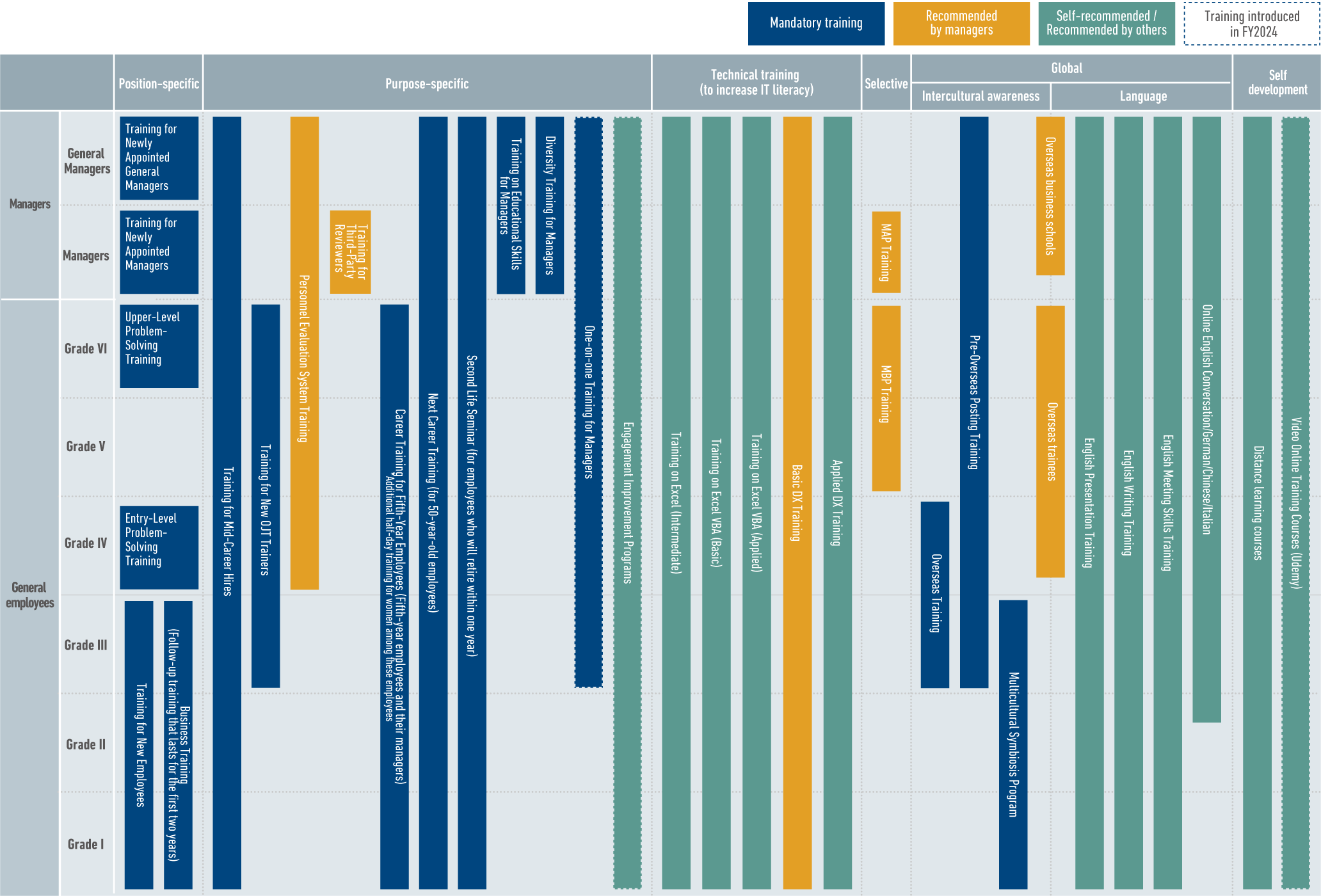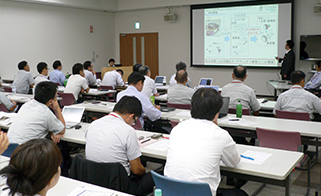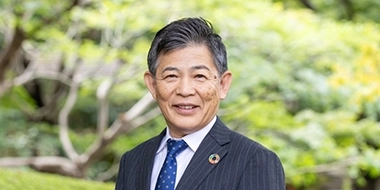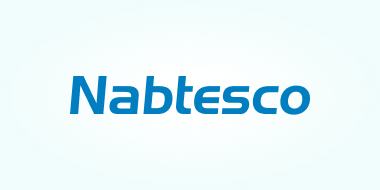
Human Capital Development
Basic Approach and Policy
Human Capital Development Toward Building the Optimal Human Capital Portfolio
As a means to secure, both quantitatively and qualitatively, personnel necessary for us to become “Leaders in Innovation,” as upheld in the long-term vision, we are reforming our education and training systems to enhance our human capital through education and reskilling while also bringing in new talent through recruitment. Moreover, for the achievement of the long-term vision, we decided to focus on digital-, women-, global and older personnel-related items as priorities for our human capital portfolio management and are enhancing and improving related training and educational opportunities.
In addition, beginning in 2024, we have introduced a managerial personnel system that reflects elements of job-based human resource management that encourages each individual to take on challenges and grow. Under this new system, the role and career information expected by the company for each position are defined in a job description (JD), and the different skills and abilities required are clarified to encourage each individual's autonomous growth. We are also focusing on supporting learning and professional development for career development, creating an environment where employees can learn autonomously anytime and anywhere, and providing diverse learning opportunities through a full menu of training programs.
Measures
System to Develop and Educate Human Resources
Nabtesco provides employees with opportunities for practical education. Recently, in addition to conventional level-specific and theme-specific training, and on-demand training opportunities have been extensively offered to employees to provide them with more learning options, thereby helping them acquire the skills necessary for their jobs. In addition, employees are provided with an educational system under which they can autonomously choose what to learn according to their own job duties, aspirations and aptitude. Nabtesco thus has nurtured a culture of learning by providing employees with both autonomous and organizational learning opportunities.
In 2024, we are expanding autonomous learning opportunities by introducing an online video learning service that enables employees to acquire cutting-edge knowledge and skills according to their own needs.
Education Scheme (excerpt) (As of July 2024)

Number of Trainees (Training Provided by the Human Resources Department from January to December in FY2023) (Unit: persons/% attendance)
| Training for New Employees | 97/100 | Training for Employees Being Transferred Overseas | 19/100 | |
|---|---|---|---|---|
| Entry-Level Problem-Solving Training | 53/100 | Overseas Position Training | 27/100 | |
| Upper-Level Problem-Solving Training | 35/100 | Overseas Language Study (overseas trainees) | 2/100 | |
| Training for Newly Appointed Managers | 23/100 | English Writing Training | 5/100 | |
| Training for Newly Appointed General Managers | 13/100 | English Presentation Training | 1/100 | |
| Training for Newly Employed Mid-Career | 54/100 | Training on Meeting Skills in an International Setting | 4/100 | |
| Business Training | 104/100 | OJT for Newcomers | 82/100 | |
| Second-Year Report Presentation (head office workers) | 24/100 | Next Career Training (for 50-year-old employees) | 67/100 | |
| Career Training for Fifth-Year Employees (for fifth-year employees and their managers) | 126/100 | Excel-Related Training | 41/100 | |
| Training on Management Basics | 21/100 | DX Training | 235/100 | |
| Dispatch to Business Schools in and outside Japan | 2/100 | Second Life Seminar | 47/100 | |
| Advanced Management Program | 11/100 | Special Training for Women | 2/100 |
Annual total number of participants (for training provided by Human Resources Dept.)
| Total hours of training | The number of hours of training per person | |
|---|---|---|
| Non-consolidated | 65,170 hours | 26.6 hours |
| Consolidated | 111,005 hours | 13.6 hours |
Return on investment in human capital (Unit: %)
| FY2020 | FY2021 | FY2022 | FY2023 | |
|---|---|---|---|---|
| Return on investment in human capital | 9.3 | 9.2 | 8.6 | 8.3 |
- *Return on investment in human capital: Gross sales - (Total operating expenses - Total employee-related expenses [salaries + various allowances])/Total employee-related expenses [salaries + various allowances]
Career Support
In order to help employees develop their careers, we provide fifth-year employees and those who will soon become members of the elderly group with career development training. Moreover, in 2022, we established a contact point both inside and outside the company for career counseling to support both new employees and those in the elderly group in building their careers. We also provide female employees and non-Japanese employees with a range of consulting services according to their life plans and to their specific problems, respectively. The career consultation service is staffed both internally and externally by nationally certified career consultants, and has handled a cumulative total of 45 consultation cases since the service was established.
In 2018, we introduced an internal recruitment system as a voluntary transfer measure. In 2023, we established the “Job Challenge System,” which adds internal and external dual job systems and an internal exchange system to this system, and we are operating human resource fluidity measures. The internal dual job system and the internal exchange system are new systems, and we are working to inject vitality into them. The external dual job system introduced in 2022 is being operated under legal restrictions while limiting the scope of application; however, unique examples have emerged, including jobs that cannot be experienced within the company and those involving the acquisition and study of skills that are connected to daily work.
Overview of the Job Challenge System
| System | Job Challenge System | |||
|---|---|---|---|---|
| Internal recruitment | Internal exchange | Internal dual job | External dual job | |
| Overview | A system whereby employees can apply for internal job openings and, through a selection process, be transferred to a department of their choice. In principle, the positions are the same as those available for career hires. | A system whereby employees can apply for internal job openings and, through a selection process, temporarily leave the department to which they belong and transfer to a department of their choice. After the exchange period completes, the employee is expected to bring back the skills, knowledge, etc. gained from the exchange program to their home department. | A system whereby employees can apply for internal job openings and, through a selection process, work in the department of their choice for a portion of their scheduled work hours. | A system whereby employees may engage in work outside the company outside of their regular working hours. Only side jobs as sole proprietorships or outsourcing contracts that do not involve an employment contract are permitted. |
Through operating and energizing the “Job Challenge System,” we will continue to provide employees with opportunities to take on new challenges, acquire new skills and knowledge, and broaden the scope of their activities, as well as promote the fluidity of human resources that will lead to organizational revitalization and, in turn, drive innovation.
Direction of the Job Challenge System
Internal Recruitment Results (Unit: persons)
| FY2020 | FY2021 | FY2022 | FY2023 | |
|---|---|---|---|---|
| Number of job openings | 36 | 40 | 69 | 76 |
| Number of applicants | 8 | 13 | 11 | 20 |
| Number of successful applicants | 3 | 7 | 0 | 4 |
Development of Experts in Digital Fields
In order to foster innovation in each of our businesses, we urgently need to create a new DX-based business model and have our own internal experts in DX to increase the efficiency of our operational process.
At Nabtesco, in addition to raising the level of IT literacy throughout the company through a variety of DX-related training programs, we are working to nurture DX human resources at an early stage by enhancing on-demand learning opportunities and providing on-the-job training through internal exchange programs in DX-related departments.
Among DX human resources, we have launched an initiative to certify those who have the skills and mindset to realize DX promotion in each department within the company as “DX Planners,” and leverage them for evaluation and promotion. We will continue to expand the number of DX planners by providing ongoing DX learning opportunities.
DX Related Training
We use assessments to measure the DX level of each employee and provide systematic training accordingly.
DX-related training includes “DX Basic Training” to acquire basic knowledge of basic DX concepts and skills such as product management, software engineering, innovative skills, digital marketing, UX, AI and data science, among others, as well as “DX Application Training” to provide inspiration and training to transform one's own work with DX. By 2023, 429 employees have received DX-related training, 78 of whom have been certified as DX Planners.
Empowerment of Women
We are working on the further empowerment of women, regarding it as one of the priority issues that we must address to ensure our organizations have access to a diverse workforce of capable personnel. For such empowerment, we deem it essential to build an organizational culture that focuses on fairness beyond simply implementing general measures to ensure gender equality and to provide both men and women with equal growth opportunities.
Based on this belief we are reforming the organization and corporate culture surrounding female employees through training and other educational programs. This is in addition to various systems and measures to support a balance between work and family life, aiming for a ratio of 4.1% of female managers by 2027. In 2023, we are further enhancing our efforts to promote diversity and eliminate unconscious bias by newly implementing diversity training for management-level employees.
Development of Globally Competitive Human Capital
In order to select, educate and retain personnel who can lead global business development, which we aim to promote going forward, we have introduced a short-term overseas training system for young employees to provide them with opportunities to gain hands-on experience in international business. We also provide mid-career employees with an overseas trainee system (work experience at overseas Group companies) to develop them into global leaders for Nabtesco.
To build an optimal human resource portfolio that realizes our long-term vision, we must expand our global human resources and the employee base of people who will become candidates for such human resources. In 2023, we revised the overseas trainee system and revamped the program so that more employees can take advantage of it, thereby speeding up the development of global human resources.
Furthermore, we are proactively developing human resources at overseas Group companies. Specifically, we are employing a greater number of local people at the companies and provide local employees with a range of education programs to help them improve their skills.
Overseas Training
Training at Overseas NPOs
In order to develop personnel who can work autonomously on a global scale, we annually provide employees with an opportunity to receive overseas training. In the training, participating employees work with overseas companies and NPOs, for which they need to use foreign languages and take a global viewpoint. This experience will later help them achieve their missions and make decisions as necessary.
In the training program, our employees are involved as project members in addressing issues actually occurring at NPOs in the Philippines, and multinational teams work together to devise, implement, and propose solutions using a variety of methods.
Our overseas training is designed to help participating employees to acquire the ability to deal with cultural differences, behave autonomously, independently and proactively and take a broader view of the world and society by experiencing social contribution activities at NPOs.
Voice from a participating employee
In July 2023, I participated in a four-week overseas training program in the Philippines (Cebu). While interning at an NGO that provides educational support, I had the opportunity to propose a new project to solve a real problem that the organization was actually facing.
Through the training, I learned that it is very important to show interest in the other party in order to have a deep discussion from an independent perspective. It is, of course, important to respect the other person's culture and language, but it is also crucial to accept and understand the other person's ideas and the thoughts behind them. While assuming this attitude, instead of just agreeing with the other person's opinion, it is necessary to accurately convey one's own opinion based on a “critical” viewpoint, which I strongly felt is the key to building a relationship of trust.
Since returning to Japan, I have always kept in mind the issues that were clarified through the training program in my daily work, and I am devoting myself to improving my skills. I would like to connect the valuable experiences and learnings from the training program to further growth in the future, and eventually take on the challenge of working overseas.
Ayaka Watanabe
Planning Department
Language Training
As overseas business is expected to continue to expand, it is becoming increasingly important to develop globally competitive human capital. We introduced a system to register in advance employees slated to work overseas so that we can provide them with essential training in a planned manner. It also builds a database of the experiences of those actually working overseas to share useful information on overseas work among employees, thereby enhancing our entire Group’s global abilities.
In order to improve English skills necessary for communication in global business, we provide opportunities for language learning through online video learning services and subsidies for online English conversation classes. In addition, we regularly hold training on English writing skills, presenting in English, and international meeting skills.
Empowerment of Older Workers
For the optimization of human capital, we aim to empower all our employees to make meaningful contributions. To this end, we focus on providing employees aged 50 and older, who represent a large age group at Nabtesco, with environments where they can exert the full range of their abilities.
In 2021, we offered next career training and on-demand learning opportunities to employees in that age group to provide them with an opportunity for reskilling so that they can bring their abundant experience to bear in working on new tasks.
Improving Basic Skills of Young Employees to Immediately Become an Effective Workforce
We provide new graduates who have joined the company with intensive training in a planned and systematic manner during their first two years of work, deeming this time to be optimal for enhancing their basic skills. Specifically, we provide them with annual training programs in consideration of their individual growth stage, thereby helping them to improve year by year.
We also give new employees on-the-job (OJT) training, believing it to be important to offer them hands-on work experience so that they can become an effective members of the workforce as soon as possible. Under the OJT system, OJT staff members provide careful instructions to individual trainees, while the trainers themselves also receive training to maintain their high ability to provide such instruction. In addition, a common training plan worksheet designed to visualize the contents and progress of the training is used for all trainees to create a uniform, high-quality training environment.
In their third year of work, after the basic skill improvement period ends, we dispatch all employees who have graduated from university to an overseas training (e.g. intern) program in order to develop human resources with a self-sufficient spirit through cross-cultural experiences.

Second-Year Research Report & Presentation
Development of candidates for top executives
The Nabtesco Group is implementing the Management Advanced Program (MAP) to develop candidates for top executives through selective training. Under MAP, trainees will enhance their skills for rational organizational management and deepen the understanding of themselves. Specifically, they will improve their leadership skills from the viewpoint of managers and learn about management strategy and technovate strategy to create new ideas and business models for the enhancement of their organizational competitiveness.
Also, through this training program, trainees can make exchange and share experiences and ideas with managers of other companies to build new interpersonal ties. Since the program began in 2021, 42 people have attended it in total.
Development of Human Capital at Overseas Group Companies
We are proactively endeavoring toward the development of human resources at Group companies outside Japan. For example, we are actively employing local human resources and implementing various training programs aimed at improving the skills of locally hired personnel. In China, we provide business management trainings for executive candidates at business locations to promote the appointment of locally employed staff for managerial positions and from this talent pool, appoint the presidents of Group companies outside Japan. In addition, we offer an OJT-based training programs designed for skill enhancement, in which employees of overseas Group companies are assigned, for a certain period of time, to factories in Japan belonging to various business segments, including the railroad vehicle equipment, hydraulic equipment, commercial vehicle equipment, and automatic door businesses.
By offering opportunities to deepen their understanding of the Nabtesco Group’s corporate culture and The Nabtesco Way that supports it, and to learn specialist skills, we are developing workers who can contribute to economic development in their home countries. We will continue these efforts to reinforce our overseas operational bases and to contribute to the economic and social development of the countries in which we operate.
Personnel Evaluation System for Human Capital Development and Role Performance
We evaluate both managerial and general employees on the extent to which they achieve set goals and specific actions taken to generate results. The evaluation results are used for development through feedback and reflection between managers and subordinates, and are reflected in bonuses, promotions, and salary increases as incentives for contribution and performance.
Managers are thoroughly engaged in role-based goal setting and evaluation operations based on JD, and the “MBO evaluation” draws out each individual's commitment to achieving organizational goals by linking organizational and individual goals. In addition, in the “Behavior Evaluation,” which evaluates specific actions taken to create results, the degree to which actions are put into practice is assessed for a total of seven items. These include “Achieving Change” and “Demonstrating Leadership,” which are closely related to the long-term vision, and “Compliance,” which stipulates awareness-raising and information dissemination regarding compliance within the organization. The behavior evaluation reveals the degree of practice and gaps in the expected behavior for the position, leading to reflection, and is used as a training guide for assuming a higher position.
For general employees, in addition to thorough target setting and evaluation work based on grade definitions, evaluator training is held regularly to cultivate evaluators' assessment and feedback skills through role-playing sessions. Furthermore, in the “Ability Evaluation,” which assesses specific actions for creating results, compliance/code-of-conduct adherence is incorporated into the evaluation items, as in the case of managers. Under the evaluation system, managers and subordinates have the opportunity to review the set goals and actions taken to achieve them every six months for managers and every three months for general employees.
In addition, from April 2024, we are rolling out “one-on-one” meetings throughout the company. By providing monthly opportunities for dialogue on work progress and other topics that will lead to better awareness of subordinates, we are working to promote daily follow-up to achieve targets and improve the relationship of trust between managers and subordinates, which is the foundation for appropriate personnel evaluations.



